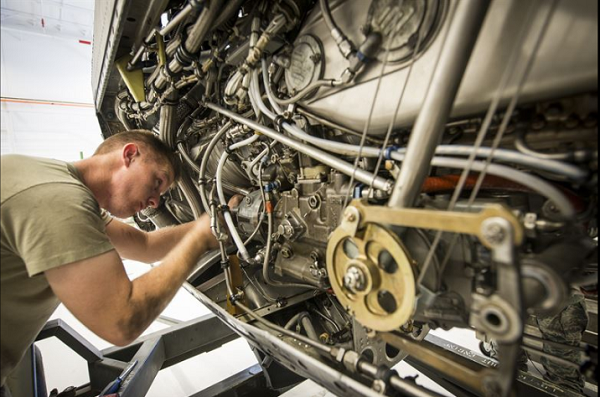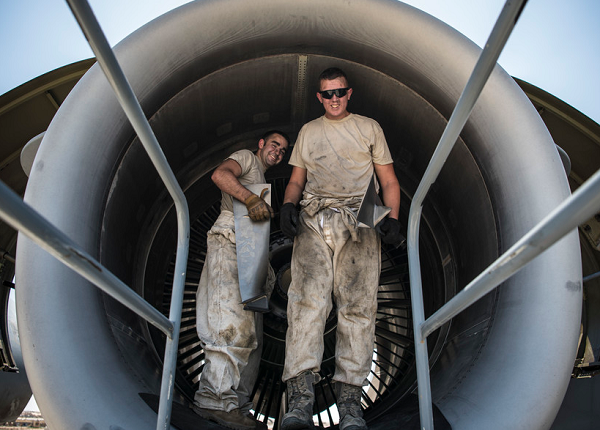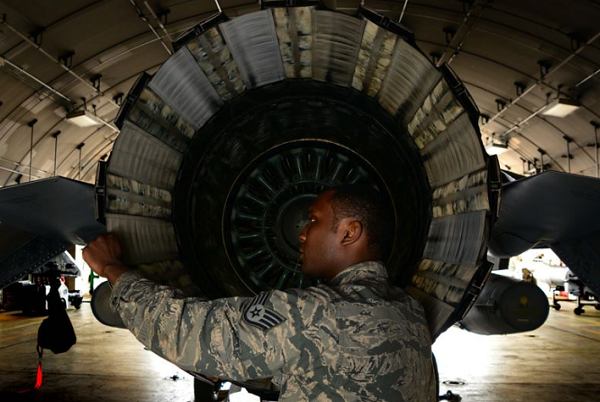Air Force Aerospace Propulsion (2A6X1) specialist test, maintain and repair the engine of an aircraft.
These individuals have the important task of making sure the engine and all of it’s systems are in superb condition for a safe flight.
From diagnostics to supervising test runs, these maintenance professionals apply skill and knowledge to any necessary aircraft engine repair.
Related Article – How To Join The Space Force
Education, Qualifications and Training
This Air Force position requires a previous knowledge of propulsion principles in addition to the standard testing and requirements.
Education
Individuals seeking to join the Air Force in this position must have a High School Diploma or GED.
Recruits will be required to take and pass the Mechanical ASVAB test.
Qualifications
The qualifications to enter into this position include:
- Normal color vision
- At least 17 years old with parent consent, 18 without
- No older than 39 years old
- Complete an applicable aerospace propulsion maintenance course for desired specialty
- Mechanical, electrical, hydraulic and hydromechanical principle knowledge
- Complete/Pass National, Local and Credit checks
Training
All recruits will attend Basic Military Training for 8.5 weeks.
They will then attend Technical Training at Sheppard Air Force Base in Texas for 34-61 days.
Related Article – Navy Electronics Technician (AT): Career Details
What are the job tasks of an Air Force Aerospace Propulsion Specialist?

Aerospace propulsion essentially cover anything that makes the aircraft move forward.
In the Air Force, this means that specialist could work on a variety of engine types including turboshaft engines, jet engines, turbine engines and more.
Aerospace Propulsion specialist initially inspect the engine and components for any potential issues.
Inspections can be preventative or because an issue is suspected.
These specialist are in charge of diagnosing all engine problems.
This includes fuel, electrical, oil and engine airflow systems of the aircraft.
They will refer to previous maintenance logs and data bases to find repeat issues.
Aerospace Propulsion specialist will use different tools to diagnose and repair the aircraft engine.
Some of these tools include drawings, diagrams and technical instructions.
Power tools, hand tools, testing equipment, stands and specialized tools are also used.
Specialist are required to have vast knowledge of the different aircraft engines and propellers and have an understanding of how to use the above tools properly to diagnose issues for each system.
In training, specialist will focus onto certain engine types and become experts of that engine.
After inspecting and diagnosing potential issues, the specialist will remove defective components and install serviceable machinery.
Specialist will make recommendations for any other maintenance that may need to be performed outside of their scope of work.
Any servicing schedules or maintenance schedules for the engine will be created by the specialist.
Maintenance that is performed will be thoroughly documented.
After an engine is fixed, specialist will supervise test runs of the aircraft to ensure that the system is running properly.
Testing an engine will be done in a contained space to eliminate any potential harm and eliminate noise hazards.
Any hazardous waste that accumulates will be properly handled and disposed of.
Related Article – Air Force Flight Engineer (1A1X1): Career Details
What does an Air Force Aerospace Propulsion Specialist get Paid?
Although this position does require some extra clearance checks and courses, it is still considered an entry level position.
Individuals starting into this position, with no prior Military experience would likely still rank lower.
The starting salary for individuals in a lower rank (E-1) is around $1600 a month.
As you increase in rank, so does your pay.
You can find more information on Air Force ranks and pay by clicking here.
Benefits
The good thing about the Air Force is from day one you begin earning college credits.
The credits that you earn in technical school directly apply to Aviation Maintenance Technology.
The Air Force allows you to build on that degree by offering the Air Force Tuition Assistance program, the Post 9/11 GI Bill and the Montgomery GI Bill.
There are also scholarship options for certain positions and between the tuition assistance and scholarship options, most individuals pay little to nothing for college.
Other Air Force benefits include:
- Insurance
- Housing Allowance
- Food Allowance
- Retirement
- Vacation
- Recreation
More information about benefits and the positive aspects of the Air Force can be found here.
Job Reviews
This is a maintenance position but is specific to one component on the aircraft.
Individuals in this position are required to be very knowledgeable.
Previous Aerospace Propulsion specialist discuss the enjoyment they get out of working on engines.
They also note that it is hard-work and can be both physically and mentally demanding.
You can view the video below for information on Aerospace Propulsion tasks and how this recruited individual feels about their specific position.
Related Article – Air Force Airborne Mission Systems Operator (1A3X1): Career Details
Civilian Career Opportunities
Working in maintenance in the Air Force allows for a career in aviation maintenance as a civilian.
Working in propulsion offers more opportunities because you can apply skills to other areas such as automobiles, if you choose.
This career field is generally in demand in terms of open positions.
Large companies such as Boeing or the Kennedy Space Center generally have positions open relating to propulsion.
Possible job titles for a related civilian position include:
- Propulsion Service Engineer
- Aerospace Engineer
- Propulsion System Design Engineer
- Propulsion Development Technician
- Aerospace Engine Structural Analyst
Open positions with the job titles above generally start around $60-$70,000 annually.
This, of course, depends on experience, location, company and can vary up or down.

Summary
Air Force Aerospace Propulsion (2A6X1) specialist are in charge of ensuring the engine in a plane is in perfect working order.
The specialist in this position have the important task of inspecting, testing, repairing and maintaining all engine components.
This is a position that requires both entry level qualifications, security checks and appropriate course completion.
While in this program, airman are offered many benefits including education tuition assistance to advance their career.
Individuals in this position like the work that they perform and often refer to it as exciting.
The skills, discipline and knowledge learned in this position will directly relate to aerospace propulsion positions as a civilian.
Related Article – Marine Engineer Equipment Operator (MOS 1345): Career Details
References
Air Force Aerospace Propulsion
- 5 Worst Jobs in the Air Force - June 20, 2024
- 4 Steps For Visiting An Air Force Recruiter Near You - June 19, 2024
- Air Force Safety Specialist (1S0X1) - June 19, 2024




